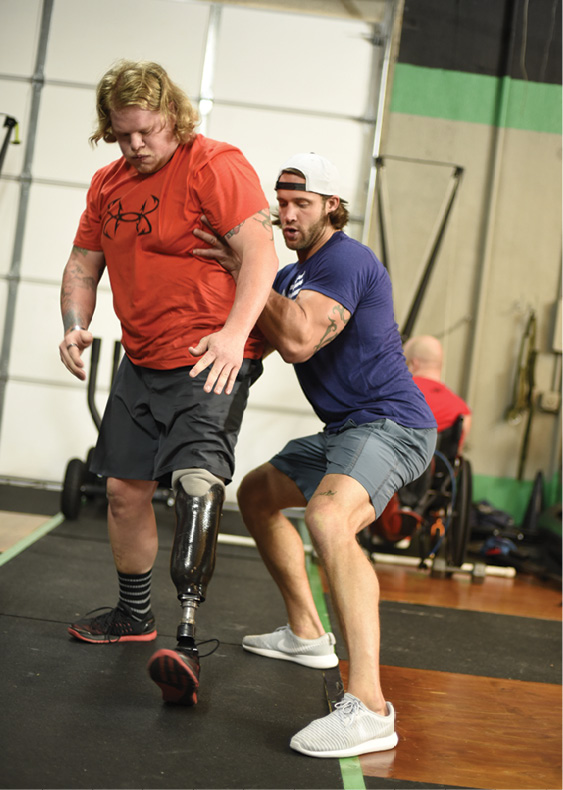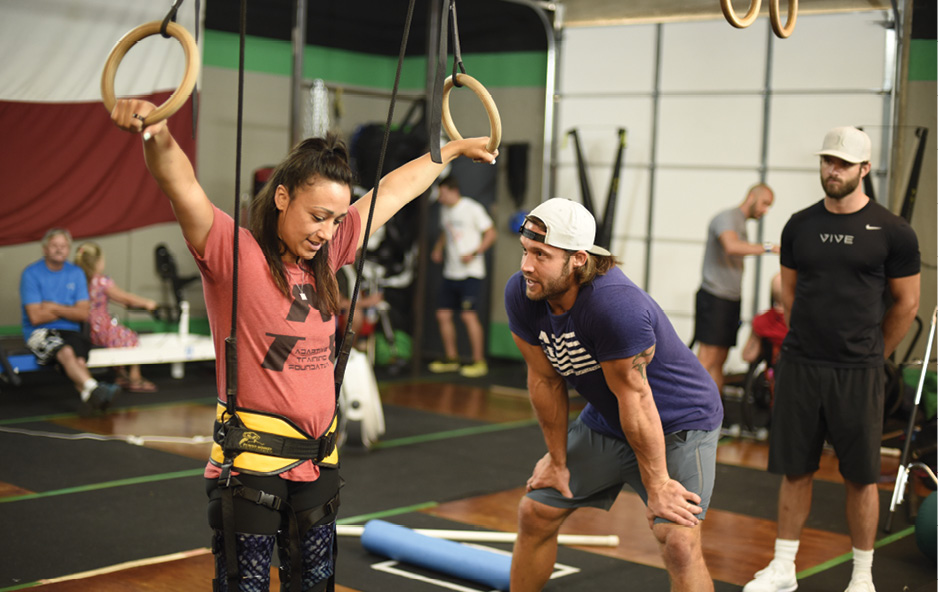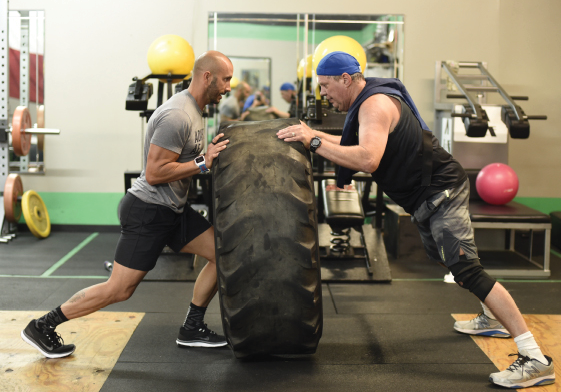The makeshift gym, hidden within an industrial lot in Dallas, is at capacity. Every Friday morning people come here, many missing arms or legs or both, and push themselves to the point of exhaustion. The majority are disabled veterans, but there are others. There is no exclusion in this tribe.
Today, though, is different. At the moment, no one is lifting weights or working with the medicine balls. And there are more visitors than usual. More than 100 family members and friends are gathered in the middle of the room around David Vobora, a former NFL linebacker. Many have driven for hours to be here, to honor the memory of one of their own. Trevor Toberny, a local firefighter and EMT, died due to complications from a blood clot.
Toberny broke his back on duty in 2000, but was able to return to work after extensive physical therapy. Then in 2014, he had a blood clot and two years later—after 28 surgeries in 20 months—one of his legs was amputated. That autumn, he was a member of the seventh class held by the Adaptive Training Foundation (ATF), a nonprofit run by Vobora and several volunteer personal trainers. At graduation, after nine grueling weeks, Toberny was named the class’s Patriot Award winner for his inspiration and leadership.
In giving the eulogy at Toberny’s funeral a few days before, Vobora said, “He stood for all that is good about humanity. Trevor’s heart was the biggest muscle in his body.” After saying a few more words (“Death exists so we know how much to cherish life”) to the packed gym for Toberny’s memorial service, Vobora calls up one of Toberny’s sons, a high school senior. Vobora then tells a story about the time Toberny was vomiting during a workout while simultaneously bringing Gatorade to another member of his group.
The room laughs away their tears and soon enough, the workout session begins. Although the ATF classes are limited to just 10 people and have a lengthy waiting list, Fridays are a free-for-all, a reunion of all former graduates and anyone who wants to drop in. The organized chaos lasts about an hour, groups going station to station. Vobora, 31, is the epicenter, a gifted orator in constant motion, his near-shoulder length brown hair usually hidden by a backward baseball cap. In any given minute, he’s chatting with a visitor, taking a photo with another, motivating a man with no legs to complete a pull-up, and in the quickest of blinks, finding time for a few reps on the weight bench himself. He remains in football shape, standing 6-foot-1 and weighing in at 238 chiseled pounds.
“There is pain going on,” Vobora says. “They are tired, physically exhausted, yet they are not suffering. They are all smiles. There is love, and you can feel that energy, that’s what’s driving each of them. They are aspiring to be their best ‘me.’ ”
Related: David Vobora on Pushing Past Limitations
***
Vobora has been broken himself. He was sexually abused as a 10-year-old and later had an addiction to painkillers that nearly led to his death. On vacation with his then-girlfriend, now wife, Sarah, in Hawaii following his fourth and final season in the NFL in 2011, Vobora—who started taking painkillers to overcome shoulder injuries and a concussion—says he wanted to jump off of the balcony in their hotel room. He wanted the pain, suffering and dependency of addiction to end.
“Physical pain reminds you you’re alive but mental pain tests your willingness to stay that way.”
A few days later, he was in rehab, in the detox unit. There he suffered two seizures, and endured days of vomiting and losing control of his bowels. He lost 34 pounds in seven days.
“I was going to heat up some tuna casserole one night, and as I tried getting out of bed, my body kind of short-circuited—a tremor—and I hit the ground,” Vobora says. “The plate shattered, and as I was scraping up the pieces of the plate, the nurses came rushing in and restrained me, thinking I was going to use it to cut myself. That is bottom.”

Vobora spent a month in treatment and hasn’t touched a painkiller in the six years since.
Growing up in Eugene, Oregon, Vobora had two passions: the military and football. His earliest memories are sitting on his father’s lap watching the game, asking questions. Football was their common language, the elder having played at the University of Oregon. His paternal grandfather served 31 years in the U.S. Marines and fought in three wars. If not for football, Vobora says he would have joined the military, which would have made him a fourth-generation Marine.
“My grandfather was my hero,” Vobora says. “I couldn’t get enough war stories, just couldn’t get enough. I think I have always had it in me to search for something greater than myself.”
Related: 13 Powerful Quotes About Inner Strength
After rehab in 2012, Vobora and Sarah moved to Dallas for a fresh start. He opened a gym for elite athletes called Performance Vault, where he trained college and professional football players and Olympic athletes. There he met retired U.S. Army Staff Sgt. Travis Mills, a quadruple amputee who served in the Iraq and Afghanistan wars. The two started working out together, with Vobora doing exhaustive research on how to train those without arms or legs so they could develop core strength.
Mills told another amputee veteran about Vobora, who told another, and soon a dozen of them were working out with Vobora a few times a week. Then every day. Vobora was so busy that on occasion he would sleep on a yoga mat at the gym. He barely saw his wife and two young daughters. There was no way he could continue training both athletes and the disabled.

He made a hard decision. In September 2014, he launched ATF and dropped all of his paying athlete clients. Around that time, he met Vanessa Cantu, 34, who nearly died in a car accident as a high school freshman. The damage to her spinal cord was so severe she was confined to a wheelchair at first. After thousands of hours of therapy, she was eventually able to walk with crutches and leg braces.
After becoming pregnant, she shifted her focus to being able to walk with a cane so she could hold her daughter. She started doing CrossFit and soon met Vobora, who picked her to be in the first ATF class.
“For 14 years, I never thought myself worthy of being in shape,” Cantu says. “Someone who can’t walk can’t be sexy or fit. I learned to embrace the pity party. David and I started working out, then the first class started. I remember he asked me that first day, ‘What’s the goal?’ I said, ‘To hold my daughter’s hand and not be scared of falling down.’ ”
Participating in ATF classes transformed how Cantu viewed her life, she says. “I hadn’t walked a mile since the accident and after our class graduated, I walked a mile in 27 minutes. Now I’m training for a 5-mile obstacle course.”
Related: 5 Ways to Turn Mental Challenges Into Unstoppable Strengths
Chris Wolff, 34, joined the Air Force when he was 18 and served 11 years as an aircraft mechanic. While deployed in Afghanistan, he also helped fly caskets home—at one point, nearly 200 of them in three months. In October 2008, in his hometown of Tacoma, Washington, he had a flu vaccination at the local Army Medical Center. Nearly three weeks later, his legs gave out when he tried getting out of bed, and his wife called 911. He was paralyzed from the waist down, a C4 quadriplegic, because of acute disseminated encephalomyelitis (inflammation of the brain) caused by the flu vaccine.
After two years in the hospital, Wolff was able to lift his hand off of the bed, which inspired him to work even harder, eventually training for the National Veterans Wheelchair Games. He met Vobora in the parking lot at a 2015 competition in Dallas.
“David saw something in me that I didn’t,” Wolff says. “First, he had me on the trampoline, then in the gym. There is no disability with David. He treats everyone the same—like equals. There is tough love, and there are never, ever any excuses. I was told I would never eat on my own, that I would never move any part of my body. I laid in a hospital bed for two years. After completing my ATF class, I walked out of the gym with crutches. I stood up without assistance.”
At the conclusion of each ATF class, typically the week before graduation, Vobora takes the group on a trip that is partially funded through donations. For Wolff’s class, it was skiing in Lake Tahoe. For four days, Wolff, the trainers and the other nine members of his group spent their days on the slopes.
“If you are willing to show your scars, then you are proof that you are moving beyond them, that they don’t define you.”
“Here we were, 10 veterans who had been sitting down not long ago without the ability to stand, and we’re tracking down the snow, like regular people,” Wolff says. “With David, we just keep reaching for higher and higher goals. My ultimate goal is to walk my two daughters down the aisle one day with no crutches. They are 7 and 2, and the one rule I have with them is they aren’t allowed to use the word can’t.”
ATF has now completed 10 classes—that’s 100 lives changed. Aside from those who came from out of state for the class, almost all alumni return for the Friday workout. ATF is planning to move to a state-of-the-art gym soon, with equipment specially designed for the group. Vobora calls his ATF classes his tribe—not his team—for a reason.
“A team is a roster, organizational chart, roles and responsibilities,” Vobora says. “A tribe recognizes the importance in making and empowering people. Within that tribe, the perceivably weakest person—the most impaired person, who couldn’t feed himself, or push his wheelchair up the ramp—can maximize their effort, maximize their ambition and be an intricate part to the sum of the whole tribe.”
***
Vobora has many mentors, from Starbucks executive chairman Howard Schultz to business executives Ross Perot Jr. and T. Boone Pickens. He’s a natural people person. He has a book, The Hope Dealer, coming out in 2018 and is interested in entering the political arena as an independent in a couple of years.
ATF costs $4,500 per person for the nine-week training, which is funded through grants, donations and corporate sponsorships. Vobora’s next goal is expanding—bringing what his group has mastered and teaching others to do the same. There are thousands who could benefit from ATF, thousands who could change their lives with its core principles to restore, recalibrate and redeploy.

The trainers, who most days outnumber those in the class, are all volunteers. One of them, Morris “Mo” Brossette, has been with Vobora since the first class.
“There aren’t many opportunities like this,” Brossette says. “It’s such inspiring work. A lot of these people, before they came to us, they wouldn’t have minded dying. We had a guy with Parkinson’s in our last class. He needed two and a half minutes to walk 20 feet, and then he collapsed in tremors. After the nine weeks, he was water-skiing.”
Of the 10 completed classes, not a single person has dropped out. When every class starts, Vobora talks with each person, asking a simple question: What is the end goal? That becomes the focus. Each session is designed around reaching that goal. ATF is in the business of changing lives, teaching broken people to trust others and have faith again.
“You cannot manufacture what it is to feel hope,” Vobora says. “When you meet these people, they all say they just want to go back to normal. I don’t trust unbroken people. If you are willing to show your scars, then you are proof that you are moving beyond them, that they don’t define you.”
Watching one of the ATF workouts, it becomes apparent how Vobora and his trainers treat everyone exactly the same. There is no sympathy. There is no babying. There is no, Well, this guy served his country in two wars and he has no legs, we should give him a break. And that’s how participants want to be treated. During their time in the gym, they are just like anyone else—drenched in sweat and pushing their bodies to places previously believed unreachable.
“One of our veterans in the program told me, ‘Physical pain reminds you you’re alive but mental pain tests your willingness to stay that way,’ ” Vobora says. “I thought it was brilliant, because the invisible scars that we don’t put out on the surface define us. When you go toward that and go toward your fear, that is one of the greatest lessons of your life.”
Related: Why You Should Keep Pushing Through Your Setbacks
This article originally appeared in the February 2018 issue of SUCCESS magazine.




